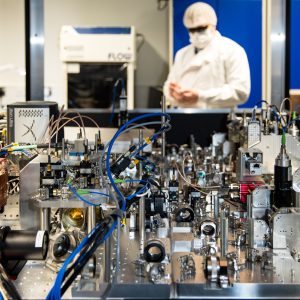
Novo Holdings has announced its investment of $200m (€188m) into quantum computing startups. In a statement published earlier today, the majority shareholder in pharmaceutical giant and Ozempic creator Novo Nordisk said that quantum technologies held vast transformational potential for life sciences and were on a steep developmental trajectory, especially in the firm’s home region of Scandinavia. The news is a welcome boost for the quantum scene amid declining private investment.
“Combining Novo Holdings’ longstanding experience in developing the life sciences ecosystem in the Nordics with the quantum activities and commitment from the Novo Nordisk Foundation provides a very powerful platform for building quantum startups,” said Novo Holdings’ managing partner for seed investments, Søren Møller. “Our ultimate goal is to create, grow and develop strong quantum technology companies in the Nordics.”

Novo Holdings’ confidence in potentiality of quantum
Quantum computing promises leaps and bounds in computational power when applied to certain types of niche mathematical problems. As such, advocates of the technology maintain that the application of quantum computing to areas like logistics, energy production, weather prediction and pharmaceuticals could lead to transformational breakthroughs in each. This hinges, however, on the successful harnessing of qubits – the basic computational unit of a quantum computer – in their hundreds, which so far has not been practically achieved.
Novo Holdings’ interest in quantum computing began in 2022 when it announced another investment of $200m in creating the first quantum device dedicated to life sciences research. The company hoped that the computer would be used to expedite the prediction of molecular structures, vital in determining the viability of new medicines. “Within the life sciences…we can accelerate development in personalised medicine by letting quantum computers process the enormous quantity of data available about the human genome and diseases,” Lene Oddershede, senior vice-president of natural and technical sciences at the Novo Nordisk Foundation, told the Financial Times.
Since then, Novo Holdings also appears to have been encouraged by the growth of Denmark’s ecosystem of quantum computing startups, with the company identifying the Copenhagen-based Deep Tech Lab – Quantum as one potential beneficiary of the new funding. “However,” the firm pointed out, “the investment mandate is global, so although Denmark will be the centre of gravity, Novo Holdings will potentially also invest beyond the Nordics.”
Private investment lacklustre in quantum compared to public funding
Harnessing quantum computing technology successfully, Oddershede added in today’s statement, was also contingent on Novo Holdings’ ability to realise “the full value chain and establishing robust partnerships.” This was the reason, the firm said, why most of the investment would be concentrated in Denmark, given its history of facilitating successful public-private ventures.
Recent breakthroughs in connecting multiple quantum devices into larger computers do indicate a viable path for commercialising quantum computing technology. However, enthusiasm for investing in the field seems to largely reside with national governments over and above venture capitalists, with publicly-funded projects dwarfing private schemes throughout 2023 as market attention remains fixated on the potentiality of AI. The utility of that technology in the life sciences has not been ignored by Novo Nordisk, either, with the firm announcing a new partnership last month with Nvidia to build its own AI-powered supercomputer.






